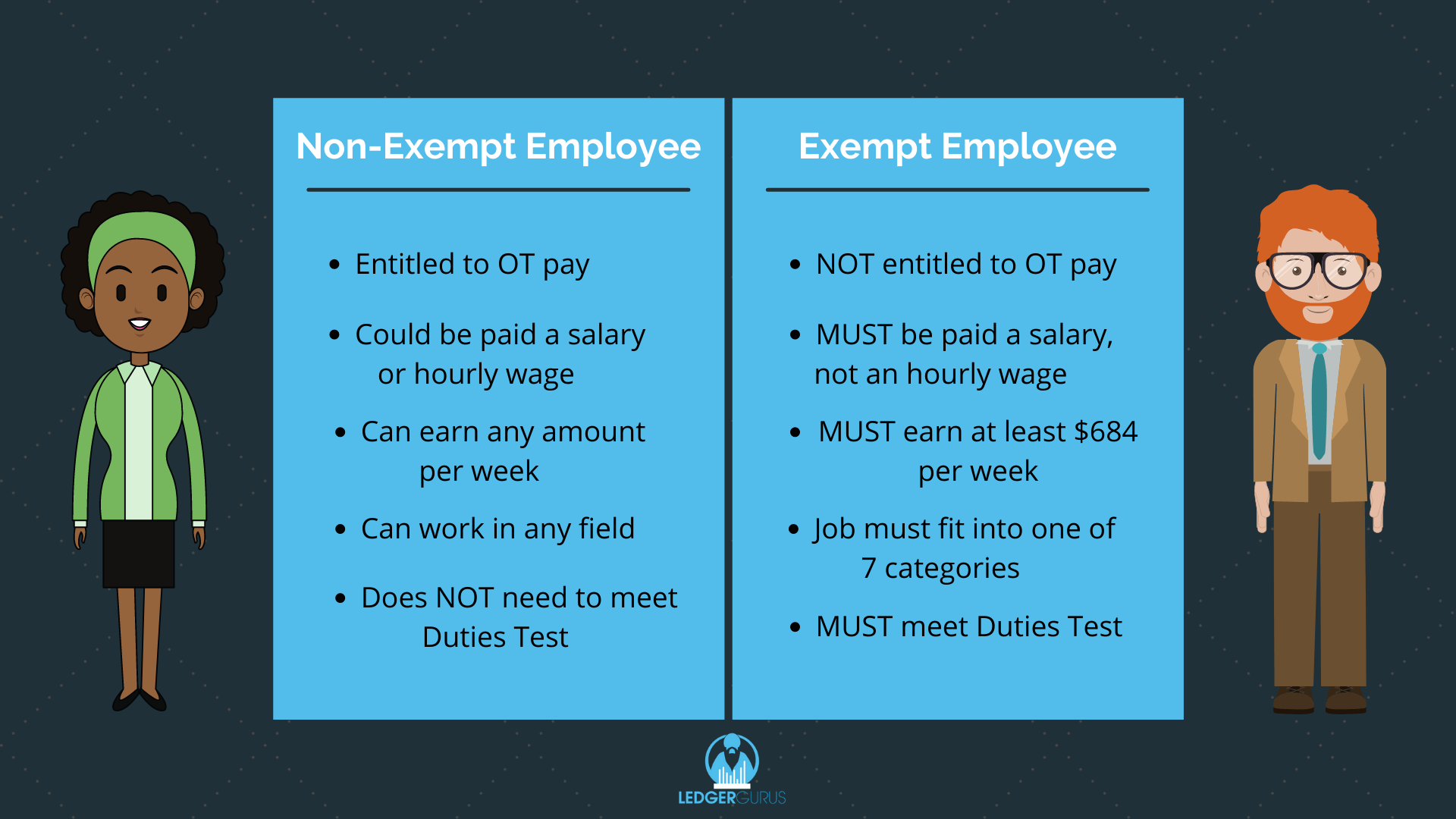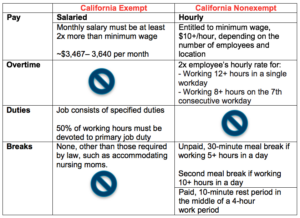What Is the Difference Between Exempt and Nonexempt Jobs Explain
This is probably the most well known difference between the two. Exempt employees are not eligible for overtime while non-exempt employees must be paid overtime when working over 40 hours in a workweek.

Exempt Vs Non Exempt Employees Learning The Differences Wrapbook
Its one of the most misunderstood sets of rules in all of HR compliance.

. Employees in Exempt positions are not compensated for working more than 40 hours per week. The difference between exempt and non-exempt positions is their involvement in Canadian employment laws and regulations. What is the difference between exempt and non-exempt jobs.
Under federal law that status is determined by the Fair Labor Standards Act FLSA. The simplest way to explain the difference is to understand which employees are entitled to overtime pay and which ones arent. While this includes hourly paid employees it can also include.
Exempt employees arent entitled to overtime pay but nonexempt employees are provided they work more than 40. The IRS recognizes two kinds of employees. There are many differences between these two types of employment but the main dissimilarity is their pay for overtime work.
As an employer you can have your exempt employees on the job for 40 hours 20 hours or 70 hours. That said the difference between exempt and nonexempt status is reflected in both job duties and pay status. In contrast since nonexempt workers must be compensated for overtime if they work more than 40 hours per week it is typically in the best interests of employers to keep nonexempt employees hours as low as.
Non-exempt employees is fairly straightforward. Exempt employees are paid a salary and not entitled to overtime. There are important variances between the two types of employment.
Exempt are employees upon whom the provisions of FLSA do not apply while non-exempt are those employees that fall under the regulations of FLSA Non-exempt employees need to keep track of extra hours put in by them in a week and need to be paid extra time not less than their hourly wage rate for every extra hour more than 40 hours. Exempt employees are not eligible for overtime while nonexempt employees are eligible for overtime pay. In the United States a non-exempt employee is an employee that 1 must be paid at least the federal minimum wage for all hours worked during a workweek up to 40 hours and 2 must be paid at a rate of pay that is equal to one-half times the regular rate of pay for all hours worked over 40 during a workweek.
The difference between exempt vs. In this article we explain what non-exempt employees and salaries are discuss some considerations for non-exempt salaried employees and provide some examples. Specific guidance comes from the federal and state level depending on where.
Exempt positions shall be exempted from the minimum wage overtime and. Notice that the overtime requirements are not. As a job seeker understanding the difference helps determine the calculations for how youll get paid.
Rather they are compensated for completing the tasks assigned to them. Exempt employees are not entitled to overtime while non-exempt employees are. In brief exempt employees are ineligible for overtime and non-exempt employees are eligible for overtime.
The primary difference in status between exempt and non-exempt employees is their overtime eligibility. But if youre like most people the difference between the two groups is hazy at best. In order to qualify as exempt certain criteria must be met.
Exempt employees are exempt from overtime pay. Non-exempt employees are paid hourly wages and entitled to overtime pay. The term exempt refers to overtime and its the easiest way to understand the difference between these two classifications.
The key difference between exempt and non-exempt employees is that non-exempt workers are entitled to certain protections under the Fair Labor Standards Act a federal law that sets minimum wage and overtime requirements. Below we explain the major differences between the two classes of employees. Exempt positions are roles that are not protected under Canadian employment laws while non-exempt positions are roles that are protected under these laws.
Nonexempt employees typically work only the prescribed number of. Nonexempt employees on the other hand are entitled to receive overtime pay. Exempt Employees Certain types of employees often classified as exempt employees are not entitled to overtime pay as guaranteed by the Fair Labor Standards Act.
Exempt and Non-Exempt statuses are legal classifications that companies use to distinguish between different types of employees. The Fair Labor Standards Act FLSAs rules governing overtime pay have challenged employers for decades in large part due to whats. The primary difference in status between exempt and non-exempt employees is their eligibility for overtime.
And per some estimates between 70 to 90 percent of employers get it wrong. Up to 20 cash back Generally exempt employees are paid more than nonexempt employees because they are expected to complete tasks regardless of the hours required to do them. Overtime pay is not required by FLSA for exempt employees.
Heres information on the differences between exempt and non-exempt workers employees who are entitled to overtime pay and workers who are exempt from overtime pay requirements. Navigating the FLSA Duties Test Decoding Overtimes Trickiest Rules. Stated simply if youre exempt then youre not entitled to receive any compensation for overtime hours that you work.
The type of work an employee does. Youve probably come across these terms while filling out an application in job advertising or casual conversation. If staying late or coming in early is required to do the job exempt employees are frequently expected to do just that.
Employees primarily performing work that is not subject to overtime provisions of the Fair Labor Standards Act. However the University chooses to pay overtime to exempt Non-V Class employees. Employees primarily performing work that is subject to the overtime provisions of the Fair.
On every employee job listing youll notice that some positions are exempt while others are non-exempt. Answer 1 There are two basic categories of workers at workexempt employees and non-exempt employees The word exempt means exempt from overtime pay. Under federal law that status is determined by the Fair Labor Standards Act FLSA.
Exempt jobs are those jobs that do not have a minimum wage overtime regulations and other rights and protections generally given to nonexempt emp View the full answer.

Exempt Vs Non Exempt Salary Employees Ledgergurus

Exempt Vs Nonexempt Sources Of Confusion In California Kpa

Difference Between Exempt And Nonexempt Employees Allbusiness Com
0 Response to "What Is the Difference Between Exempt and Nonexempt Jobs Explain"
Post a Comment